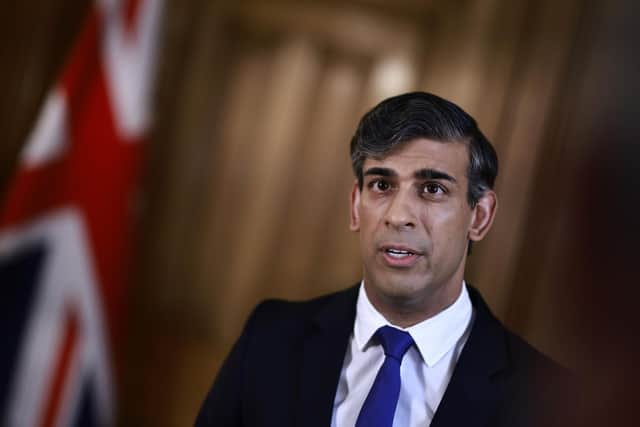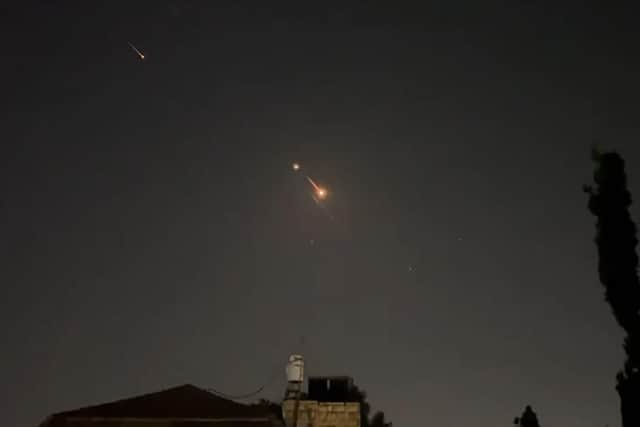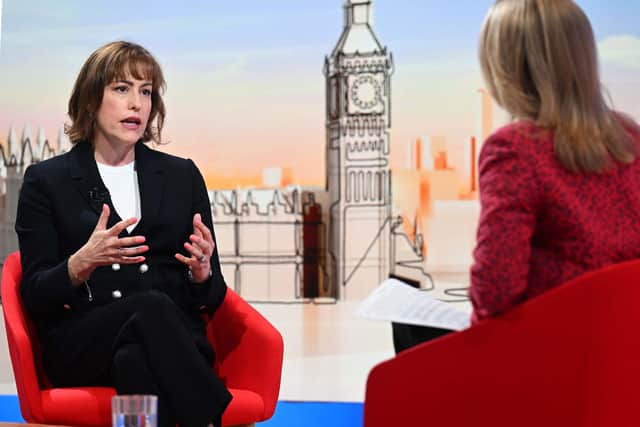Israel defended by UK fighter jets against Iran drone attack - what happens next amid escalation fears
Prime Minister Rishi Sunak has called for “calm heads to prevail” amid fears Iran’s unprecedented attack on Israeli soil could drag the already volatile region into a wider war.
Israel’s war cabinet minister, Benny Gantz, has said it will “exact a price” when the timing is right after a barrage of more than 300 drones and missiles were launched by Iran, but Tehran has warned that any “reckless” relatiation to the aerial bombardment would result in a “much stronger response.”
Advertisement
Hide AdAdvertisement
Hide AdWith UK and US aircraft helping to intercept the weapons, concerns are also mounting over the potential implications of any future military action on national security and the Middle East at large.
According to Israeli military spokesman, Rear Admiral Daniel Hagari, Iran launched more than 300 drones and missiles during the near five hour-long bombardment, including 30 cruise missiles and 110 ballistic missiles. He said some 99 per cent of the drones and missiles were intercepted either over Israel, or outside its airspace.
While Israel’s advanced air defence system and its fighter jets played a leading role in that effort, at least four other countries also deployed military forces by way of support, with the UK among them.
Mr Sunak confirmed the UK participated in an “international co-ordinated effort” to intercept the missiles and drones fired by Iran and shot down “a number of drones,” although it is not clear how many. It is known RAF Typhoon jets were deployed from bases in Cyprus, with the Ministry of Defence (MoD) stating warplanes in Iraq and Syria had been deployed to intercept “any airborne attacks within range of our existing missions.” The RAF jets were deployed over Syrian and Iraqi airspace, as opposed to the skies over Israel. Essentially, it appears that UK jets were filling in for US Air Force aircraft, freeing them up to fly directly over Israel.
The MoD also confirmed it had moved several additional RAF jets and air refuelling tankers to the region to bolster Operation Shader, the UK’s existing counter-Islamic State operation in Iraq and Syria. “In addition, these UK jets will intercept any airborne attacks within range of our existing missions, as required,” it added.


iran’s attack was seen as a retaliatory measure in the aftermath of a strike on the country’s consulate building in Damascus, which killed seven Islamic Revolutionary Guard Corps officers, including a senior commander. The Iranian government has accused Israel of carrying out that attack, but Israel has neither confirmed nor denied it.
Speaking ahead of a meeting of G7 leaders, Mr Sunak said it was clear Iran was “determined to sow discontent and destabilise the region, its own backyard.” He also pledged the UK's continued support for the security of Israel and the wider region, adding: “If this attack had been successful the fallout for regional stability would be hard to overstate and we stand by the security of Israel and the wider region, which is of course important for our security here at home.”
Labour leader Sir Keir Starmer said the party supported all measures “designed to restore calm” and prevent a wider regional war. In a statement, he condemned Iran's “decision to subject Israelis to these unacceptable attacks,” and said: “The international community has been united in urging restraint and we regret that yet again Iran has chosen a different, dangerous path.”
Advertisement
Hide AdAdvertisement
Hide AdFirst Minister Humza Yousaf condemned Iran’s actions, and said the international community should demand that all parties abide by UN Security Council resolutions. He also repeated calls for a ceasefire and said that an immediate ceasefire in Gaza was “the bedrock of peace in the region.”


What is clear is that Israel’s closest ally, the US, played a far larger and more direct role in the defence operation, with President Joe Biden stating his country had helped Israel to “take down nearly all” of the drones and missiles.
Defence and security officials from both nations were in close contact as the attack was launched, and it is understood US forces operated from a US base in al-Tanf in Syria, as well as along the Jordanian border. They intercepted more than 70 one-way attack drones and at least three ballistic missiles, with the missiles stopped by warships in the eastern Mediterranean Sea, where two US Navy destroyers are based. Both are guided missile destroyers capable of intercepting missile and drone launches. US officials have also said US fighter jets shot down drones bound for Israel.
In a statement, Mr Biden said he directed US military aircraft and ballistic missile defence destroyers to the region "over the course of the past week”, adding: "Thanks to these deployments and the extraordinary skill of our servicemembers, we helped Israel take down nearly all of the incoming drones and missiles.”
The Israeli media also stated the Jordanian air force were involved in the defence effort, helping to destroy dozens of Iranian drones, with some intercepted in Jordanian airspace, and others downed close to the Iraqi-Syrian border.


Israel's military also said France was among the countries involved in defending against Iran's overnight attack on Israel, although it is unclear if any of that nation’s jets were involved in shooting down missiles or drones. "France has very good technology, jets, radar – and I know they were contributing in patrolling airspace," Mr Hagari said.
The burning question now is the extent of the support Israel’s allies will continue to offer. That largely depends on what Israel does next. Amid widespread calls for restraint from across the region and the international community, its war cabinet convened on Sunday afternoon to discuss a response.
In a statement issued beforehand, Mr Gantz said: “We will build a regional coalition and exact the price from Iran in the fashion and timing that is right for us.”
Advertisement
Hide AdAdvertisement
Hide AdAccording to CNN, the US has made clear it will not participate in any offensive operations against Iran. In the aftermath of the attack, US defence secretary Lloyd Austin said the US did not "seek conflict" with Iran, but added that it would "not hesitate to act to protect our forces and support the defence of Israel", and that US forces would "remain postured to protect US troops and partners in the region, provide further support for Israel’s defence, and enhance regional stability.” White House national security spokesman, John Kirby, said on Sunday that the US isn’t seeking “a wider war in the region.”
Jordan's prime minister Bisher Khasawneh said his armed forces would confront any attempt by any party that endangered the kingdom's security, while also warning that any escalation in the region would lead to “dangerous paths.”
Comments
Want to join the conversation? Please or to comment on this article.